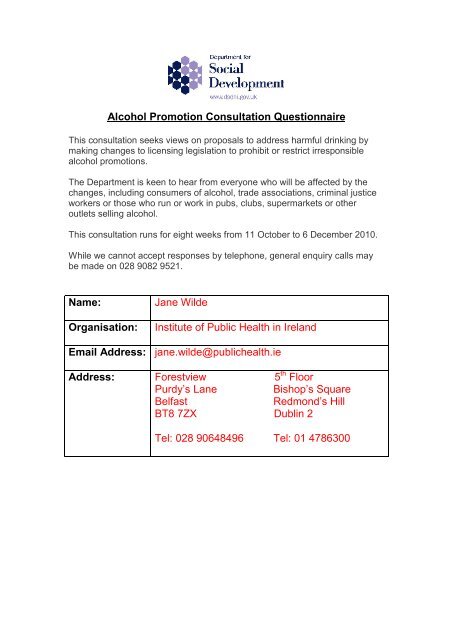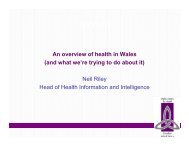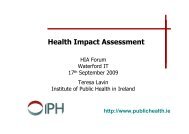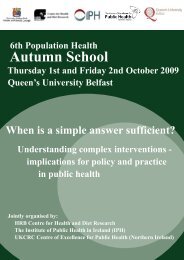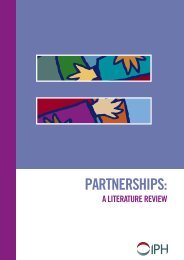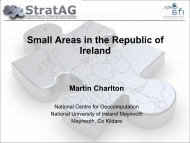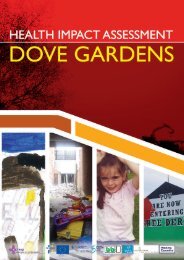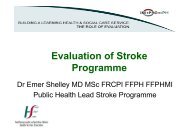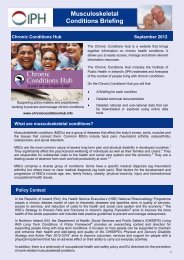Alcohol Promotion Consultation Questionnaire - Institute of Public ...
Alcohol Promotion Consultation Questionnaire - Institute of Public ...
Alcohol Promotion Consultation Questionnaire - Institute of Public ...
- No tags were found...
You also want an ePaper? Increase the reach of your titles
YUMPU automatically turns print PDFs into web optimized ePapers that Google loves.
<strong>Alcohol</strong> <strong>Promotion</strong> <strong>Consultation</strong> <strong>Questionnaire</strong>This consultation seeks views on proposals to address harmful drinking bymaking changes to licensing legislation to prohibit or restrict irresponsiblealcohol promotions.The Department is keen to hear from everyone who will be affected by thechanges, including consumers <strong>of</strong> alcohol, trade associations, criminal justiceworkers or those who run or work in pubs, clubs, supermarkets or otheroutlets selling alcohol.This consultation runs for eight weeks from 11 October to 6 December 2010.While we cannot accept responses by telephone, general enquiry calls maybe made on 028 9082 9521.Name:Organisation:Jane Wilde<strong>Institute</strong> <strong>of</strong> <strong>Public</strong> Health in IrelandEmail Address: jane.wilde@publichealth.ieAddress: Forestview 5 th FloorPurdy’s LaneBishop’s SquareBelfastRedmond’s HillBT8 7ZX Dublin 2Tel: 028 90648496 Tel: 01 4786300
Q1. Which <strong>of</strong> the following do you believe are ‘irresponsible promotion <strong>of</strong>alcohol (please tick yes or no for each)providing an alcoholic drink free or cut-price on purchase<strong>of</strong> one or more drinks (whether alcoholic or not);YES this ISirresponsiblepromotion <strong>of</strong>alcoholNO this is NOTirresponsiblepromotion <strong>of</strong>alcoholproviding an alcohol drink(s) free or cut-price onpurchase <strong>of</strong> that particular drink – two for one; providing an unlimited supply <strong>of</strong> alcohol for a fixedcharge (including any entrance fee) e.g. “all you candrink for £10”, “pay your entry fee then drink for free until10pm”;encouraging a person to buy or drink a larger measure <strong>of</strong>alcohol than they would otherwise have intended; encouraging specific groups to drink for free or at adiscount e.g. “ women drink for free”, “ half price drinksfor under 25s”, discount nights for students or cheapdrinks for fans <strong>of</strong> a specific sporting team;relating to an alcoholic drink which is likely to appealUnclealargely to under 18s;rbasing a promotion on the strength <strong>of</strong> any alcohol; rewarding or encouraging drinking alcohol quickly, thatis, drinking games; <strong>of</strong>fering alcohol as a reward or prize - unless the alcoholis in a sealed container and consumed <strong>of</strong>f the premises; the supply <strong>of</strong> alcohol on licensed premises at a reducedprice during a limited period on any day (“happy hours”);andproviding two or more alcoholic products in a package ata reduced price. dispensing alcohol directly by one person into the mouthUnclea
<strong>of</strong> another (other than where that other person is unableto drink without assistance by reason <strong>of</strong> disability);rQ1a: Are there any other activities you would consider as being‘’irresponsible promotion <strong>of</strong> alcohol’? if yes please state these below:Sponsorship is a form <strong>of</strong> alcohol promotion not addressed within theconsultation. The sponsorship <strong>of</strong> youth events and/or groups by alcoholcompanies including music festivals, sports events, student groups, sportsteams etc, most particularly those groups whose members are under 18.Providing vouchers for free alcohol in the post or on websites.Online promotion <strong>of</strong> alcohol on social networking sites etc.The use <strong>of</strong> loyalty cards and bonus points from the purchase <strong>of</strong> alcoholtowards acquiring another product or service. Similarly the use <strong>of</strong> loyalty cardsor bonus points arising from the purchase <strong>of</strong> products or services that can beused towards the purchase <strong>of</strong> alcohol.Providing free alcohol- branded merchandise ( t-shirts, headgear, electronicequipment) with the consumption <strong>of</strong> a certain amount <strong>of</strong> alcohol.Supermarket and <strong>of</strong>f-licence promotions selling alcohol at below cost prices.Q2. The Department for Social Development is considering introducing newpowers which will allow the control <strong>of</strong> alcohol promotions which mayencourage excessive alcohol consumption.Would you agree with such regulation?YesPlease comment further:IPH welcomes the commitment to develop legislation to discourage excessivealcohol consumption and thereby tackle the substantial health and socialharms caused by our current pattern <strong>of</strong> alcohol consumption.In particular we welcome that the Minister for Social Development and hisDepartment has grasped the opportunity to bring Northern Ireland legislationin line with corresponding law in Ireland (notably the recent Intoxicating LiquorAct 2008) and indeed across the UK. Harmonised policies will benefitpopulation health on the island and strengthen all-island policy overall. It is
our hope that the development <strong>of</strong> this legislation will facilitate theimplementation <strong>of</strong> the Intoxicating Liquor Act whose provisions were put onhold pending further North/South discussions and consideration <strong>of</strong> issuesrelating to cross-border trade and smuggling .We also welcome this consultation as a significant development towards thedelivery <strong>of</strong> the vision set out in the New Strategic Direction on <strong>Alcohol</strong> andDrugs 2006-2011 and the Young People’s Drinking Action Plan.We are delighted to follow on from IPH comments made in the consultation <strong>of</strong>alcohol labelling in the UK in March 2010.We welcome the commitment made in this consultation document to affordfurther consideration to issues <strong>of</strong> minimum pricing and below cost selling <strong>of</strong>alcohol which has a significant cross-border dimension. As the issues <strong>of</strong>pricing and promotions are closely interlinked, most notably in times <strong>of</strong>economic recession, this would form a natural part <strong>of</strong> the development <strong>of</strong>policy on promotions.Q3. Such new powers in relation to alcohol promotion may have impacts inother areas. DSD would welcome any comments or views you mayhave on the following or in any other areas which you may consideraffected:ReligiousBelief• EqualityPositiveNegative NonexWhat are your reasons andhow might any negative impactbe minimised?PoliticalOpinionxRacial GroupxGender ? See section on health impactsMarital StatusxAgex
Persons witha disability orpersonswithoutPersons withdependentsor personswithoutSexualOrientationxxx• HealthThe serious consequences <strong>of</strong> alcohol-related ill-health in Northern Ireland arewell described in the literature and in the consultation document. In NorthernIreland there are approximately 250 alcohol related deaths each year and thesignificant rise in alcohol-related admissions to hospitals in the past few yearsis ominous. At a time when departmental budgets are necessarilyconstrained, reducing unnecessary hospital admissions is imperative. Thereare approximately 20 alcohol related road deaths each year and in excess <strong>of</strong>500 alcohol related road injuries each year. 60% <strong>of</strong> employers have reportedproblems due to alcohol misuse and overall the social cost to Northern Irelandindustry as a consequence <strong>of</strong> alcohol related harm was estimated in 1997 to£238 million. More recently, the Minister for Health, Social Services and<strong>Public</strong> Safety has revealed that the cost <strong>of</strong> treating drug and alcohol addictionis over £7million.<strong>Alcohol</strong>-related harm is strongly socially patterned, even when alcoholconsumption is not. This apparent anomaly is <strong>of</strong>ten considered to reflectthat poverty and disadvantage may amplify the negative effects <strong>of</strong> excessivealcohol consumption. Tackling excessive alcohol consumption through avariety <strong>of</strong> means including regulatory measures on promotion and pricing hasthe capacity to tackle health inequalities both in terms <strong>of</strong> the individual andindeed the negative effects experienced by their families and communities. Inboth jurisdictions the annual directly standardised mortality rate for deathsfrom alcohol abuse (including alcohol psychosis) in the lowest occupationalclass was significantly higher than the rate in the highest occupational class(280%) (Inequalities in mortality 1989-1998. A report on all-Ireland mortalitydata, IPH, 2001) <strong>Alcohol</strong> also plays an important part in deaths attributed toother diseases and to accidents and injuries.Recent IPH work points to the dramatic rise in chronic disease including
mental illness, obesity-related illness, chronic liver disease, cardiovasculardisease and stroke. <strong>Alcohol</strong> contributes to this alarming rise. Of particularconcern is the role that alcohol may play in affecting the mental health <strong>of</strong>people recently affected by adverse socio-economic conditions caused byeconomic downturn including unemployment, poverty and debt. Evidencesuggests that alcohol is <strong>of</strong>ten a factor in increasing levels in suicides.<strong>Alcohol</strong> has differing health and social impacts for males and females.Consumption patterns and behaviours as well as patterns <strong>of</strong> alcohol-relatedharm and disease are strongly gendered. Reasons include genetic factors(rates <strong>of</strong> alcohol metabolism, pregnancy, interaction <strong>of</strong> alcohol with genderrelateddisease such as breast cancer etc. ) and social, cultural and economicfactors.Regulations affecting the promotion <strong>of</strong> alcohol as set out in the consultationdocument are presumed to have comparable effects for men and women.However, we would recommend that the impact <strong>of</strong> the regulations on men andwomen be given additional consideration particularly in terms <strong>of</strong> genderspecificpromotions (e.g. ‘ladies night’), marketing <strong>of</strong> alcohol designed toappeal to young boys or girls, (e.g. use <strong>of</strong> gendered animation characters)and the specific response <strong>of</strong> men and women/ girls and boys to different types<strong>of</strong> promotion.The proposal will not be subject to a Health Impact Assessment (HIA) andIPH acknowledges that the intention <strong>of</strong> the proposal is to prohibit or restrictirresponsible alcohol promotions which has been noted as a positivecontribution in tackling alcohol-related harm. IPH would suggest that a HIAwould support the proposal to ensure that any unintended impacts wereidentified and mitigated and any positive impacts for health could bemaximised. The Department <strong>of</strong> Health in England undertook a HIA on theReview <strong>of</strong> the National <strong>Alcohol</strong> Harm Reduction Strategy for England in 2007which identified a number <strong>of</strong> areas for action to support the proposal. Thisreport may be found athttp://www.apho.org.uk/resource/item.aspx?RID=90191. Further informationon HIA may be found at www.publichealth.ie/hia and IPH would be happy todiscuss the potential benefits <strong>of</strong> HIA with DSD in relation to this proposal.No comment• Human rights• Financial implicationsNo comment
• Aspects <strong>of</strong> the regulatory impact processIPH welcomes the use <strong>of</strong> regulatory impact assessment in the document.However, we would view the issues <strong>of</strong> price and promotions as interlinked, infact inseparable, so the preferred option would be to address option 2 –introduce a ban on irresponsible alcohol promotions in combination with otherpricing interventions, including minimum pricing and banning below-cost sales<strong>of</strong> alcohol.There a number <strong>of</strong> issues to be addressed in pricing relating to competitionlaw and retail, but perhaps a commitment should be made to address thesewithin a maximum <strong>of</strong> 12 months <strong>of</strong> passing <strong>of</strong> legislation on promotions. Anyconsideration <strong>of</strong> pricing strategy will need to encompass cross-border tradeand smuggling issues.• Rural issuesNo comment• Any other issues/areas which you feel may be affected
The Freedom <strong>of</strong> Information Act 2000 gives the public access to anyinformation held by a public authority, namely the Department in this case.This right <strong>of</strong> access to information includes information provided in responseto a consultation. Your response, and all other responses to the consultation,may be disclosed on request. If you would like your response to be treated asconfidential, please indicate below.I would like my response to be treated as confidentialNoThank you for taking the time to provide your response to this consultation.Responses should be sent to:-Social Policy UnitDepartment for Social DevelopmentLevel 4, Lighthouse Building,1 Cromac Place,Gasworks Business Park,Ormeau Road,Belfast,BT7 2JBTel: (028) 9082 9521Fax: (028) 9082 9539Text Phone: (028) 9082 9500E-Mail: social.policy@dsdni.gov.ukWebsite: www.dsdni.gov.uk


